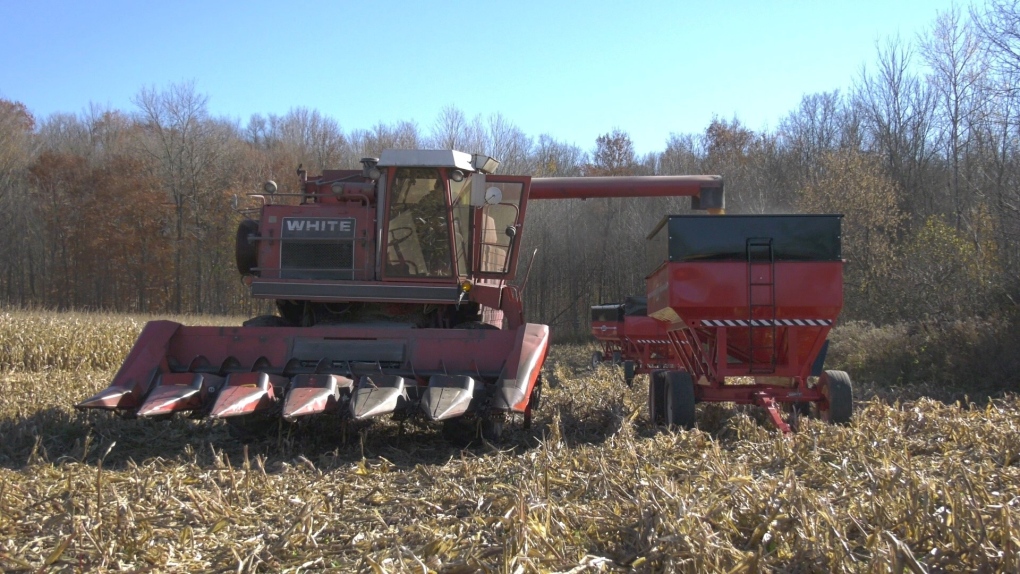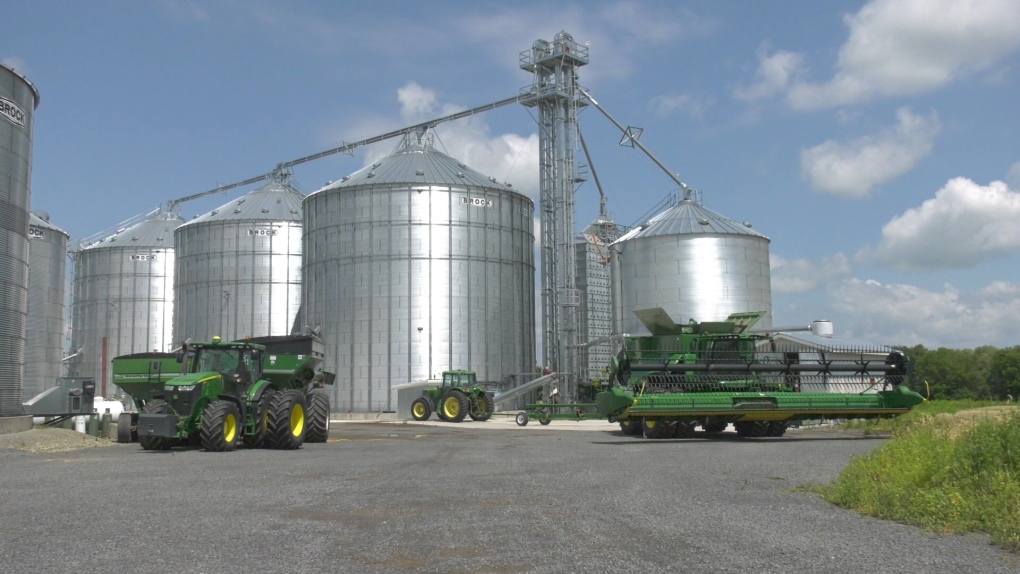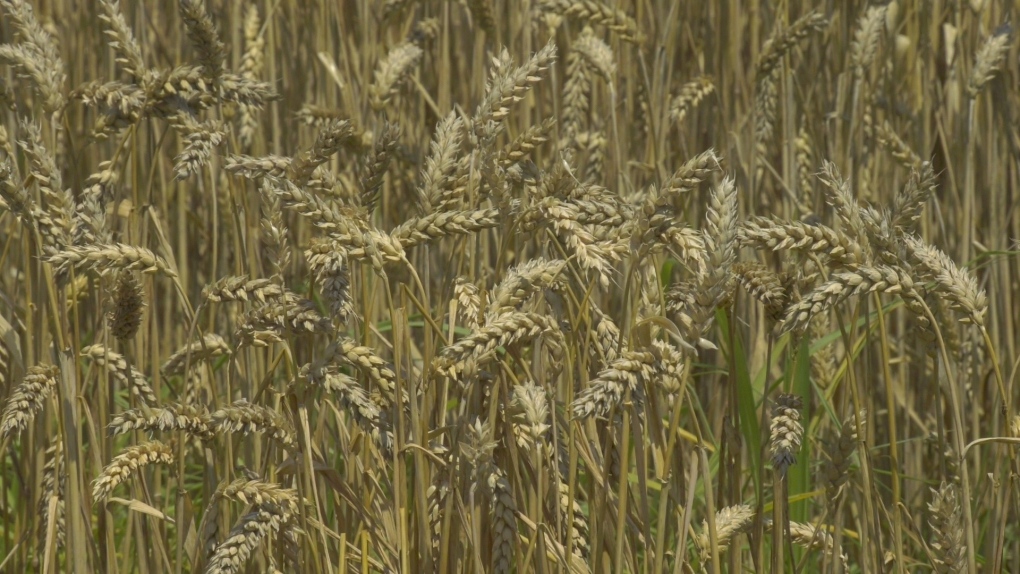Labour shortage affecting three quarters of farm industry businesses
 A combine unloads corn into a wagon near Brockville. (Nate Vandermeer/CTV News Ottawa)
A combine unloads corn into a wagon near Brockville. (Nate Vandermeer/CTV News Ottawa)
Nearly three quarters of businesses in the farming industry say they are suffering because of the current labour shortage, according to a new report from the Canadian Federation of Independent Business (CFIB).
The report states 74 per cent of agri-business owners are working more hours to make up for the lack of staff, and threatening the future of Canadian agriculture.
"A lot of businesses in the ag sector are impacted by the current shortages of labour," said Jasmin Guenette, CFIB vice-president of national affairs. "About two-thirds also said it's really difficult to recruit and retain staff."
"What it means is that businesses are losing opportunities," Guenette added. "Close to half of agriculture businesses in Canada said that they had to turn down sales because of the current shortages of labour. Many small business owners have no choice but working more hours, longer hours and they also have to ask their staff to work longer hours."
Guenette noted the agriculture industry is seeing shortages across all provinces and in all sectors of the economy.
Agri-businesses include anything that includes farm activity, like family farms, meat and dairy processing plants and fertilizer plants.
"The shortages of labour in agriculture has implications for us as consumers because, you know, it is because of those farm businesses that we have food on the table and we need to make sure that those businesses can have all the workers they need to ensure our food security," he said.
The 23-page report was released on November 7, and details the challenges and possible solutions to fix the labour shortage, including streamlining the temporary foreign worker program and immigration process, offering tax credits for agri-businesses and investing in more training options to entice young workers into agriculture.
"It's a difficult time to run a farm or agri-business in Canada," Guenette said. "Not only do businesses have to deal with shortages of labour, but businesses have to deal with the increased cost of doing business, so inflation is also hurting farm business.
 Triple J Farms in WInchester, Ont. (Nate Vandermeer/CTV News Ottawa)
Triple J Farms in WInchester, Ont. (Nate Vandermeer/CTV News Ottawa)
"The cost of inputs like food to feed the animals, the cost of fertilizer for example, these are going up," he said. "Supply chain disruption is also impacting agri-business throughout the country, delays in receiving shipments, delays in sending out food and products and so really the current situation that agri-businesses are facing is quite difficult."
"As farmers, our costs have gone up and we have no recourse to pass the costs on to our customers," said one quote from an Ontario farmer in the report. "We do not have options that are more 'carbon friendly' so we are stuck with paying."
"The carbon tax is charged on everything I buy that is transported by wheels, rail, plane of ship, but does no appear as a line item on my invoice," said another farm member from Manitoba.
Ninety-four per cent of agri-businesses said the rising prices of inputs have affected their business and 83 per cent said supply-chain challenges are creating difficulties.
Guenette says businesses that were happy to come out of the pandemic are still finding it difficult to return to normal workflow.
"We need to make sure that businesses can invest in their operations, can invest in automation for example," Guenette said. "That's why we need to lower payroll taxes, lower other costs of doing business, like the carbon tax for example, to make sure that businesses can invest in their operation, can invest in making sure that they are productive and efficient and maybe that is through automation."
 A wheat field in Winchester, Ont. (Nate Vandermeer/CTV News Ottawa)
A wheat field in Winchester, Ont. (Nate Vandermeer/CTV News Ottawa)
"Also we need to make sure that we invest in training," he added. "We need to attract young workers in agri-business. In Ontario and throughout Canada and we need to make sure that we invest in training and we provide greater opportunities for younger workers as well as other that are not as represented in the labour force to come and work in agriculture."
A report by the Ontario Federation of Agriculture this past summer said that one family farm per day on average is being lost in Canada due to urban sprawl, with some next generation farmers also opting to stay out of the family business as costs continue to rise.
"Not only agri-business owners have to deal with a very difficult business environment at the moment with the shortages of labour, supply-chain disruption, inflation and so on, but many of them are also finding it difficult to pass on the business to the next generation," Guenette said.
"That's why one of the solutions we're pushing forward is that it's easy, we need to make sure that it's easy and as cheap as possible for a business owner to transfer their family farm to their children or other member of the family," he added.
"We want to make sure that the new generation of agri-business entrepreneur takes on the challenge of running the farm, otherwise we might see some of them, or even many of them, not being able to survive," Guentte said.
CTVNews.ca Top Stories

Trudeau's 2024: Did the PM become less popular this year?
Justin Trudeau’s numbers have been relatively steady this calendar year, but they've also been at their worst, according to tracking data from CTV News pollster Nik Nanos.
Back on air: John Vennavally-Rao on reclaiming his career while living with cancer
'In February, there was a time when I thought my career as a TV reporter was over,' CTV News reporter and anchor John Vennavally-Rao writes.
Death toll in attack on Christmas market in Germany rises to 5 and more than 200 injured
Germans on Saturday mourned both the victims and their shaken sense of security after a Saudi doctor intentionally drove into a Christmas market teeming with holiday shoppers, killing at least five people, including a small child, and wounding at least 200 others.
Overheated immigration system needed 'discipline' infusion: minister
An 'overheated' immigration system that admitted record numbers of newcomers to the country has harmed Canada's decades-old consensus on the benefits of immigration, Immigration Minister Marc Miller said, as he reflected on the changes in his department in a year-end interview.
Summer McIntosh makes guest appearance in 'The Nutcracker'
Summer McIntosh made a splash during her guest appearance in The National Ballet of Canada’s production of 'The Nutcracker.'
The winter solstice is here, the Northern Hemisphere's darkest day
The winter solstice is Saturday, bringing the shortest day and longest night of the year to the Northern Hemisphere — ideal conditions for holiday lights and warm blankets.
Warrants issued for 'violent offenders' after Nanaimo jewelry store robbery
Authorities are asking for the public 's help finding two suspects wanted in connection with a Nanaimo, B.C., jewelry store robbery earlier this year.
Wild boar hybrid identified near Fort Macleod, Alta.
Acting on information, an investigation by the Municipal District of Willow Creek's Agricultural Services Board (ASB) found a small population of wild boar hybrids being farmed near Fort Macleod.
Manhunt underway after woman, 23, allegedly kidnapped, found alive in river
A woman in her 20s who was possibly abducted by her ex is in hospital after the car she was in plunged into the Richelieu River.

































